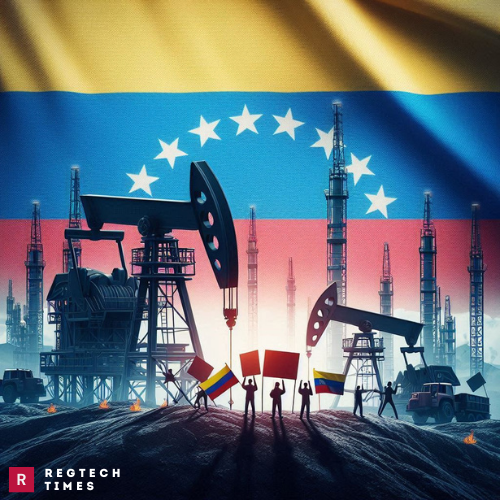The political crisis in Venezuela has taken another turn as the opposition coalition called for the U.S. to cancel oil licenses, specifically those granted to Chevron and other foreign energy companies. These licenses allow companies to continue operations in Venezuela despite sanctions, providing a critical revenue source for President Nicolás Maduro’s regime. The opposition argues that revoking these oil licenses is necessary to increase pressure on Maduro, whom they accuse of rigging elections and maintaining an authoritarian grip on power.
Oil License: A Lifeline for Maduro’s Government
The focus of the opposition’s demands centers on oil licenses issued by the U.S. Treasury Department, particularly the one granted to Chevron, the largest foreign company operating in Venezuela’s oil sector. Venezuela’s state-owned oil company, Petróleos de Venezuela S.A. (PDVSA), has been under U.S. sanctions since 2019, as part of efforts to weaken Maduro’s regime, accused of undermining democracy and presiding over economic collapse.
The licenses were originally issued in 2022 as part of a negotiation between the Venezuelan government and opposition groups. These talks aimed at improving electoral conditions and addressing Venezuela’s political crisis. However, opposition leaders now argue that the oil license granted to Chevron is giving Maduro the financial means to cling to power and perpetuate his rule, despite widespread international criticism.
In a recent panel hosted by the New York-based Council of the Americas, Rafael de la Cruz, an adviser to opposition leader Edmundo González Urrutia, stated: “We want them canceled … this is a lifeline to the regime.” The opposition believes that as long as these oil licenses remain active, foreign companies will continue to normalize relations with Maduro, bolstering his government both financially and diplomatically.
The Opposition’s Fight for Fair Elections and U.S. Support
The call to revoke oil licenses is part of the broader opposition strategy to challenge Maduro’s grip on power. Edmundo González, representing the Unitary Platform coalition in the disputed July 28 election, claims that his campaign won by a wide margin. However, the country’s electoral authorities, which have long been seen as loyal to Maduro, declared the incumbent president the victor. Allegations of electoral fraud and a lack of transparency have since dominated the political discourse.
Despite the official result, González’s campaign managed to gather vote tallies from over two-thirds of the voting machines used in the election, revealing that Maduro may have actually lost. The opposition published these tallies online in a bid to expose what they believe was a stolen election. This has led to further calls for international pressure on the Maduro regime, with the opposition pushing the U.S. to take more decisive action, including the revocation of Chevron’s oil license.
Venezuela Arrest 6 Foreigners; Accuses US Navy SEAL of Assassination Attempt
In the wake of the disputed election, legislation has been introduced in the U.S. Congress aimed at prohibiting American investments in Venezuela’s oil sector. Additionally, resolutions have been introduced in both the U.S. House of Representatives and Senate recognizing González’s claimed victory.
The Role of Oil Licenses in Venezuela’s Future
The oil license granted to Chevron, which was last renewed in September 2023 and is valid until March 2025, has allowed the company to continue its operations despite the broader sanctions against PDVSA. In a statement, Chevron reaffirmed its commitment to comply with all relevant laws and regulations, though it has remained silent on the specific call by the opposition to have its oil license revoked.
The Biden administration has adopted a cautious approach to the issue. While it initially granted a temporary reprieve from sanctions in 2022, it has since reimposed certain sanctions as talks between Maduro’s government and the opposition broke down. However, the administration left open the possibility for U.S. oil companies to apply for individual licenses, a policy that has allowed Chevron to maintain its presence in Venezuela.
The Broader Impact of Oil Licenses on Venezuela’s Political and Economic Landscape
Venezuela, once one of the wealthiest nations in Latin America due to its vast oil reserves, is now facing severe economic and humanitarian crises. Millions of Venezuelans have fled the country, seeking refuge from rampant poverty, food shortages, and a collapsing healthcare system. Despite sitting atop the world’s largest proven oil reserves, Venezuela’s oil production has plummeted, largely due to corruption, mismanagement, and international sanctions.
By revoking oil licenses, the opposition hopes to cut off one of the last remaining sources of income for the Maduro regime. They argue that without access to foreign investment in the oil sector, Maduro will be forced to negotiate a genuine transition of power. Oil licenses are, therefore, seen not just as an economic tool but as a political weapon in the struggle for Venezuela’s future.
The opposition’s call for the U.S. to cancel oil licenses, particularly Chevron’s, marks a significant escalation in the political struggle against Nicolás Maduro’s government. The oil license is viewed by the opposition as a critical lifeline for the regime, one that allows Maduro to maintain control over a country mired in crisis. Whether the U.S. will heed the opposition’s demands remains unclear, but the decision on these oil licenses will undoubtedly play a pivotal role in shaping Venezuela’s political and economic trajectory in the coming years.
The fate of Venezuela, a country rich in oil but impoverished by mismanagement and corruption, may well hinge on the revocation of these crucial oil licenses.


